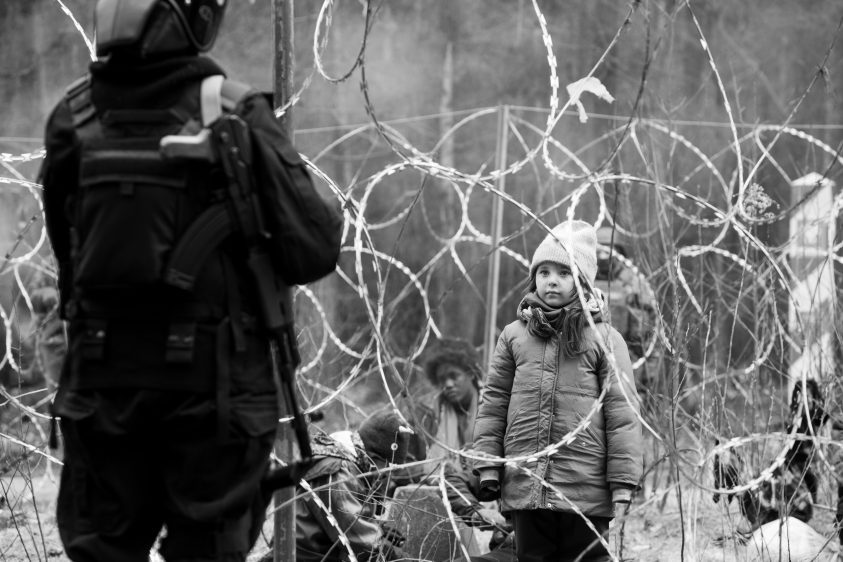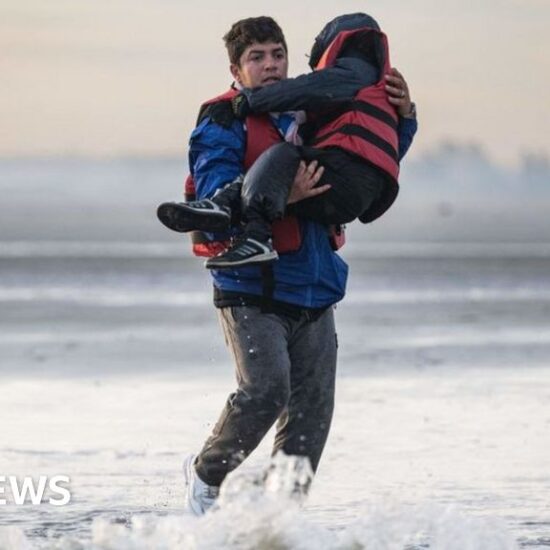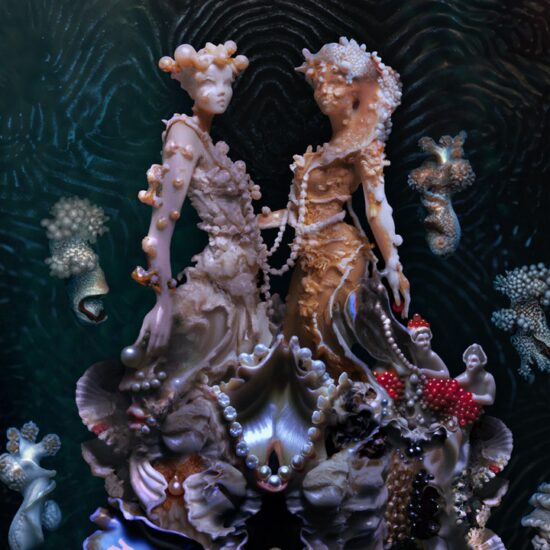
While you’re still in the vice-like grip of its multilevel narrative it may not feel like it, but a film like Agnieszka Holland’s bruisingly powerful new refugee drama ultimately comes from a place of optimism. It is optimistic to expect and nurture of a reaction of potentially motivating outrage, when you portray the brutality of which human individuals, at the behest of human institutions, are capable. It is optimistic to believe that, faced with extraordinary cruelty, a viewer’s ordinary decency will be compelled to rise and rebel. “Green Border” is a heart-in-mouth thriller set on the Polish-Belarusian border that wraps its social critique in the razor wire of punchy, intelligent cinematic craft in order to elicit precisely such emotions. If we can feel the horror, perhaps there is hope.
It is 2021 and a Syrian family are fleeing ISIS and their ravaged hometown of Harasta on an airplane bound for Belarus. They are en route to relatives in Sweden, and believe, as mother Amina (Dalia Naous) tells Afghan refugee Leila (Behi Djanati Atai ) that this overland route is “a godsend,” compared to the perils of entering the EU by sea. But she, her father-in-law (Mohamad Al Rashi), her husband Bashir (Jalal Altawil) and their children — one of them still a nursing infant — have been duped, as has Leila and everyone else on this plane. When Belarusian dictator Lukashenko broadcast the promise of safe passage through his nation to the border, it was a trap designed to further antagonize his EU neighbors. When the plane lands, the flight attendants give their passengers roses. But when they get to the Polish border, they’re met with rifle butts and razor wire, robbed and forced to run across no man’s land with only what they can carry.
The GPS on Leila’s phone shows they are, at least, in Poland, but their relief is short-lived. Thirsty, exhausted and drenched in a sudden downpour, the family, of which Leila has by now become a part, are soon picked up by Polish border guards, who despite first appearances prove to be as brutal as their counterparts in forcing migrants back through the wire border fence, back into Belarus. The “tourists,” as they’re nicknamed by their tormentors, are appallingly mistreated, beaten and starved by the soldiers on both sides because this is how the euphemism “migrant pushback” operates on the muddy ground. One man they meet in the makeshift camp reports that he’s been forced through, caught and returned five times already.
Holland’s film, co-written with Maciej Pisuk, Gabriela Łazarkiewicz-Sieczko, is outstanding in its characterization. And the stunningly natural performances from the entire cast, right down to Taim Ajjan and Talia Ajjan, who play Amina and Bashir’s young children Nur and Ghania, make it seem like these are people we know, not simply archetypes of victimhood being used to illustrate a crisis. Grandfather prays while Bashir smokes. Amina berates Ghania when she pees herself. Leila teaches Nur a few words of English: the days of the week; the phrase “I would like to stay in Europe.”
Already Tomek Naumiuk’s superb black-and-white photography is walking a clever line between handheld docu-authenticity and elegantly staged classical composition. There are moments when his dynamic camera almost inadvertently happens upon some off-the-cuff striking visual, like a fleece jacket, ripped by barbed wire, exposing its stuffing. And there are other times when we can be grateful for the small mercy of the aesthetic distance that black-and-white confers, on scenes such as the borderline unbearable instance where a pregnant woman is tossed over the seven-foot fence, and lands with a sickening, dull thump on the other side.
But Holland isn’t even halfway done achieving her film’s intimate yet epic scope. Divided into chapters the movie earns its two-and-a-half-hour runtime by focusing in turn, after Amira’s family, on a different group of people involved in the worsening border situation. Most provocatively, there’s Jan (Tomasz Włosok) a Polish border guard whose pregnant wife Kasia (Malwina Buss) does not believe he participates in the most horrifying of the atrocities, until she sees video evidence of it for herself. Then there are the sisters, Marta (Monika Frajczyk) and Zuku (Jasmina Polak), who despite different philosophies of approach, spearhead an activist organization that ventures as close to the exclusion zone as they can to provide legal advice and supplies — water, food, shoes, bandages, powerbanks to charge failing cellphones. And there is Julia (Maja Ostaszewska) a local psychiatrist who is spurred to join Marta and Zuku’s crew one terrible night when she hears a cry for help from the forest near her house and discovers Leila and an unconscious Nur neck-deep in the swamp.
At one point Jan, distracted by Kasia’s upcoming sonogram, is being drilled by his loutish captain. He bellows at his troupe again and again that the men, women and children scrambling for their lives through the wire and the woods “are not people.” Instead, he likens them to live bullets, being fired into the heart of the country that these young recruits have sworn to defend. It’s dehumanization 101, a process “Green Border,” down to its DNA, is designed to counteract. Here, every character, no matter how minor or how seemingly unworthy, is accorded a degree of private dignity which somehow avoids the pitfalls of both-sides-ism. Instead, as highlighted by an epilogue set in February 2022 at the Polish-Ukrainian border that demonstrates the very different ways refugees can be treated depending on how their (often very similar) stories of displacement are played for political capital, the film persuades us in strikingly cinematic terms, that systemic cruelty is not the rule but the aberration. It is a perversion and a degradation of the far more fundamental human instinct toward compassion, which may lie dormant at times but which, as this desperately moving film proves, is just waiting to be brought roaring back to life.













